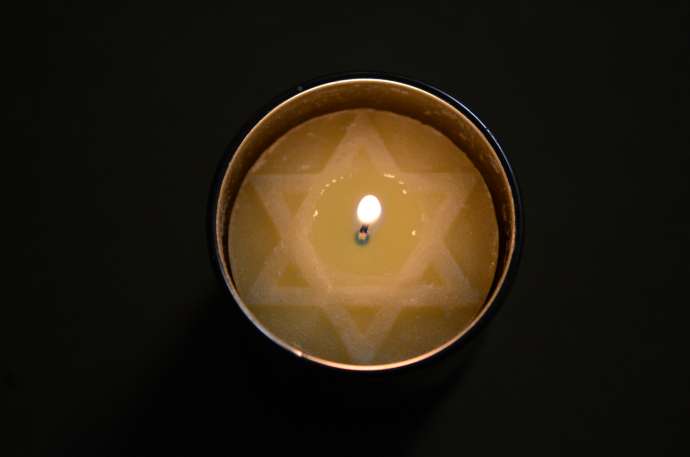STA, 27 January 2021 - Slovenia is marking International Holocaust Remembrance Day on Wednesday with a series of events, including the laying of wreaths, exhibitions and the traditional reading of the names of Slovenian Holocaust victims. Top Slovenian officials labelled the Holocaust one of the bleakest moments in history, warned against its denial and urged tolerance.
Parliamentary Speaker Igor Zorčič stressed in his address at the outset of proceedings in parliament that WWII was also being remembered because of the Holocaust, one of the darkest crimes in the history of modern civilisation.
He said its memory must be preserved as a warning and reminder, arguing the causes leading to this tragedy were still not left entirely in the past.
"Nationalism, national myths, racial and religious discrimination ... have not yet become part of the past. Some are still reviving the menacing symbols of this dark period and regime."
Despite the promises and commitments to the contrary, humanity has not learned the lesson, said Zorčič, pointing to the genocides in Rwanda and Srebrenica.
The crises of the past decade have brought to the surface new forms of intolerance, racism, xenophobia and hostility, he said, adding the rising dissatisfaction and intolerance during the Covid-19 pandemic was worrying, as it gave rise to dangerous negative emotions.
The MPs also observed a minute of silence for the Holocaust victims.
Predsednik Republike Slovenije Borut Pahor je na mednarodni dan spomina na žrtve holokavsta položil venec k spomeniku žrtvam nacifašističnega nasilja na judovskem pokopališču v Dolgi vasi. #WeRemember #HolocaustRemembranceDay #HolocaustMemorialDay pic.twitter.com/aO7dPtRwaV
— Borut Pahor (@BorutPahor) January 27, 2021
The Foreign Ministry said it was our common responsibility to stand up against all attempts to deny or distort the horrors of the Holocaust.
It believes the remembrance day is an occasion to remember all victims of one of the worst genocides in history, but also those who helped save lives.
The ministry and the Slovenian delegation at the International Holocaust Remembrance Alliance (IHRA) have supported and contributed to Holocaust remembrance, education and research for years, it added in a written statement.
Slovenian IHRA delegation head Marko Rakovec praised the many organisations and individuals in Slovenia raising awareness about the Holocaust, especially among the young.
A wreath was laid on behalf of Prime Minister Janez Janša at the Jewish section of the Žale cemetery already on Tuesday, while Boris Čerin, the president of the Slovenian Jewish Community, and Rabbi Ariel Haddad, will lay one later in the day.
President Borut Pahor meanwhile laid a wreath at a memorial at the Jewish cemetery in Dolga Vas, north-east, warning about hate speech, intolerance and incitement to violence having become an all too normal part of our life in recent years.
He said this was outrageous, and called for tolerance and the freedom of thought where everyone can express their view yet in a way that preserves dignity.
He said all people but especially public figures must refrain from words or actions that could be understood as offensive or hostile. "This is our moral and human duty of those who take part in public life, but also a political commitment."
Pahor also wished good health to the Nazi concentration camp survivors who had accompanied him to the Auschwitz liberation commemorations, including Erika Fürst, a Jew from the Slovenian region of Prekmurje.
Boris Hajdinjak, director of the Maribor Synagogue, the Centre of Jewish Culture, recalled 26 April 1944, "when for the majority of the Jews from Lendava a process leading to less than 10% surviving began".
When the survivors from Lendava, which had a thriving Jewish community before the Holocaust, realised the dead had no graves, they were allowed to erect a memorial at the cemetery in Dolga Vas, he said.
But he regretted there was no other point expect the Lendava Synagogue in Slovenia where these events could be most directly remembered. He also urged the government to make sure Slovenia finally got the long-overdue memorial point in Auschwitz for all Slovenian victims of that camp.
Later in the day the Jewish Cultural Centre will host the traditional name-reading ceremony at which the names of all Slovenian Holocaust victims will be read out loud. Due to the pandemic, it will be held online.
In Murska Sobota, the Pomurje Museum launched a virtual exhibition entitled Passports for Life, which is dedicated to Polish diplomats based in Bern who during WWII forged the passports of Latin American countries to rescue Jews.
And in Ljubljana, the National Museum of Contemporary History launched an online documentary exhibition on Slovenian victims of Auschwitz. In the evening an online debate will accompany the launch of the Slovenian translation of Sonja Borus's diary.
International Holocaust Remembrance Day is observed in memory of the day in 1945 when the Red Army liberated Auschwitz, the largest Nazi concentration and death camp.







